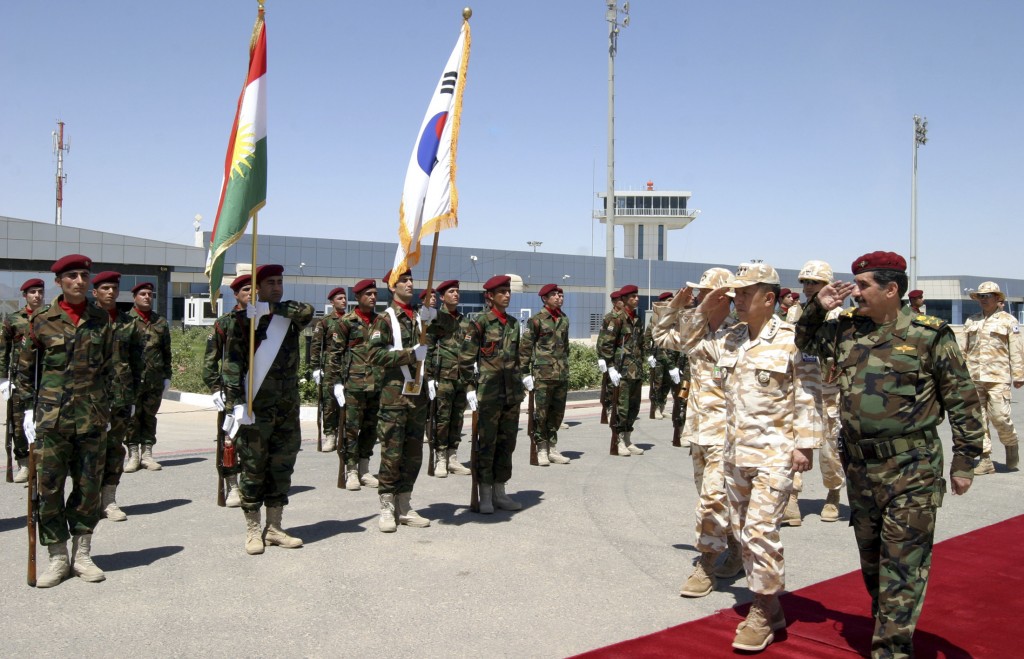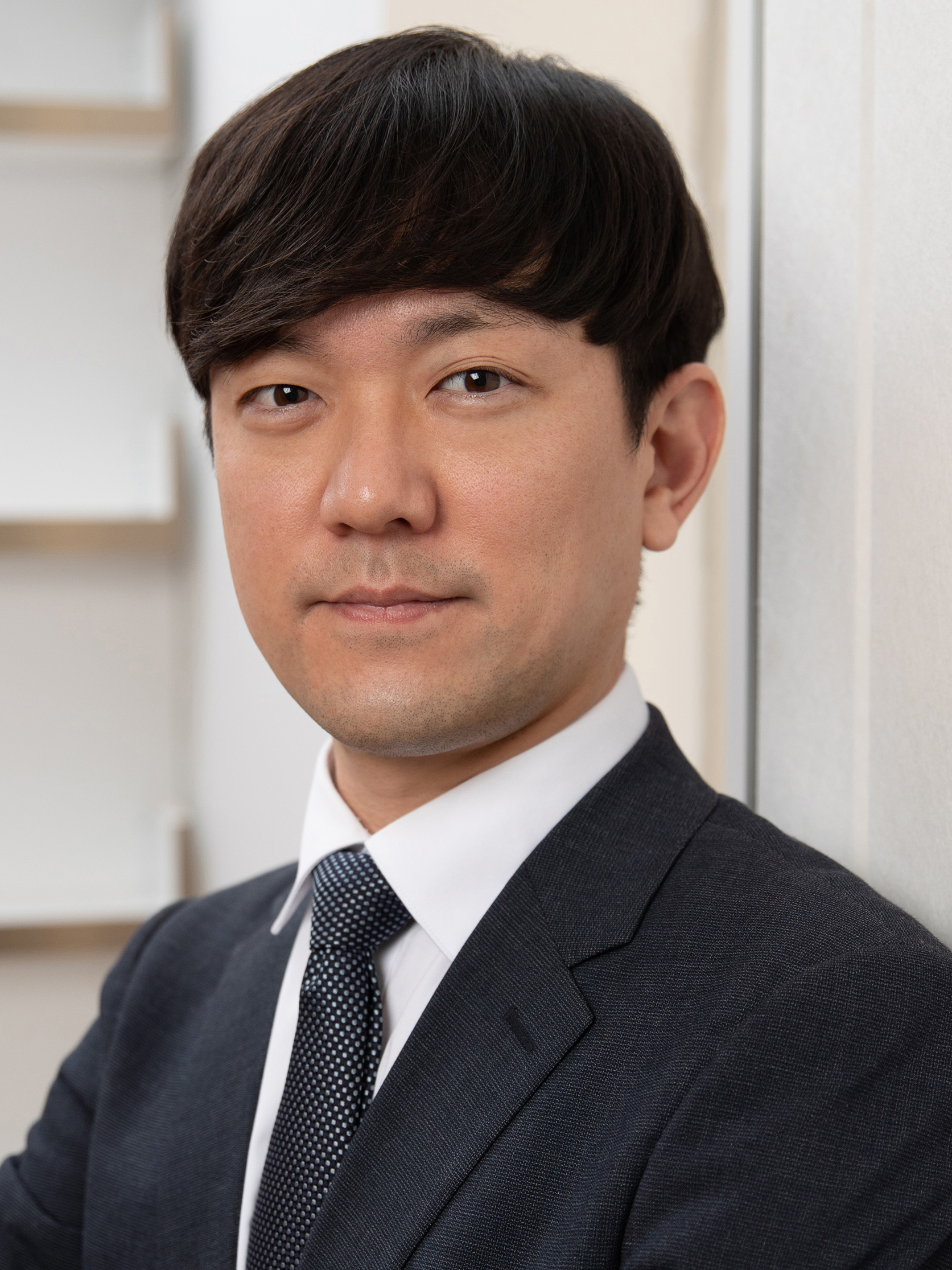Iraq’s Minister for Peshmerga Affairs in the Kurdistan region Omar and South Korea’s Chairman of the Joint Chiefs of Staff General Kim salute in Arbil
Middle East Q&A: ISIS, Kurdistan, and Korea
The radical jihadists of the Islamic State of Iraq and Syria (ISIS) have wrought terror and destruction across the Middle East, bringing already-failing states to the brink of collapse. In recent days, ISIS, or simply the ‘Islamic State’ as they now call themselves, has pushed north and west in Iraq towards the heart of Iraqi Kurdistan, executing anyone they consider a heretic and imposing an extreme interpretation of Islamic law wherever they go. United States President Obama’s announcement on August 8 of limited airstrikes to thwart the ISIS advance and distribute humanitarian aid shows its commitment to protecting Iraq and Kurdistan. Indeed, the Kurdistan Regional Government (KRG) is the only formidable shield against the ISIS onslaught. This Asan Issue Brief argues that the Korean government also has a stake in defending the people of Iraq, and particularly those of Iraqi Kurdistan, due to its long term close ties and investment. Thus, humanitarian and diplomatic support to the KRG by Korea is urgently needed.
Q. Who is ISIS and what explains its sudden rise?
A totally new generation of Islamic jihadists taking advantage of the power vacuum created by the sectarian policies of the Maliki government.
ISIS is qualitatively different from the jihadists of the past, who fought against either the “near enemy” of authoritarian Arab regimes or the “far enemy” of the United States and the West. Different from Al-Qaeda, from which it was recently disowned, ISIS heralds a new chapter in the evolution of extreme jihadism. They actively use social networking services such as Twitter, publish financial reports like a profit-seeking company, and release manifestos and narrated videos in fluent English to reach a global audience. Its fighters hail from all over the world, including Europeans, Americans, Central Asians, and even Uighurs. While Al-Qaeda recruited foreign fighters to help them in their global jihad against the West, ISIS remains—at least for the time being—firmly focused on sectarian cleansing in Iraq and Syria. It has no qualms about using foreigners as suicide bombers in even minor tactical operations.
Years of sectarian policies pursued by the Iraqi government of Nouri Al-Maliki have severely marginalized Iraq’s Sunni community, creating a fertile breeding ground for militancy and insurgency. These groups, which include tribal militias, secular Baathists from the old regime, and radical Sunni Islamists, have a range of grievances against the current government. The battlefield success of ISIS is due to this broad coalition of Sunni groups. Their capture of Mosul, Iraq’s second-largest city, in June set off a major humanitarian crisis as hundreds of thousands of Iraqis of all religious and ethnic backgrounds fled the ISIS onslaught.
ISIS has gone so far as to claim the mantle of the ‘Islamic State.’ It has its own police force, consumer protection agency, and conducts seminars on Islamic law to educate the population. In doing so, ISIS is a quasi-state actor bent on territorial conquest. Its manifestos frequently invoke overturning the infamous Sykes-Picot Agreement of 1916 which divided the Ottoman Empire between France and the United Kingdom into present-day Iraq and Syria. Scenes of ISIS fanatics proudly carrying out amputations for religious offences, mass executions of captured soldiers, and decapitating victims and leaving their heads on spikes in public squares should leave no illusion as to their organizational principles.
However, contained within ISIS’s success are also the seeds of its own downfall. Its Sunni coalition partners, without whom ISIS could not have orchestrated complex battlefield maneuvers, have begun to realize that they may have made a pact with the devil. The former Baathist officials are Arab socialists and cannot tolerate the enforcement of a hard-line interpretation of Islamic law by ISIS. This broad but fragile coalition will not last long. Moreover, ISIS victories so far owe less to its incredible strength than to the embarrassing weakness of the Iraqi military.
Q. Why is the fighting in Iraqi Kurdistan a game-changer?
The Kurds are the only ones capable of stopping ISIS and, in the long term, they may become an independent state.
Unlike the Iraqi central government, on which the U.S. spent tremendous amounts of money without success, the KRG possesses a more professionalized military, institutional capacity, and political accountability. As ISIS forces approached, thousands of Iraqi troops fled Mosul and other northern cities, leaving behind their American-provided weapons, uniforms, and vehicles, not to mention hundreds of thousands of civilians. However, the professionalism of the peshmerga, the Kurdish military forces, has been in stark contrast to the collapse of the Iraqi army. If ISIS is able to conquer Iraqi Kurdistan, it will only be a matter of time before its forces once again turn to Baghdad and further south, potentially leading to the total breakdown of Iraq as a state. The Kurds are the last military force standing between ISIS and all-out civil war.
Indeed, over the past decade, the Kurds have successfully governed their region even as the rest of Iraq slide into sectarianism and civil war, proudly pointing out that not a single coalition soldier died in Kurdistan during the war, nor was a single foreigner kidnapped. Also, in a part of the world where democracy remains rare, the Kurds strive towards political representation and inclusive government. The people are secular yet religiously tolerant, with Muslims, Christians and many other denominations living side-by-side. In addition, their economic potential is also significant, with estimates that Iraqi Kurdistan could possess up to 45 billion barrels of oil in mostly untapped oil fields. In sum, the success of a viable Kurdistan is thus crucial to the future of Iraq as a whole.
The current fighting in Iraqi Kurdistan is also a game-changer in the long term in that it may lead to the creation of a powerful, independent Kurdistan. If ISIS is eventually defeated, the KRG will wield enormous strategic influence in the future of Iraq. It could pave the way for the de-facto partition of Iraq as a sovereign state, fracturing the country along Kurdish, Sunni Arab, and Shiite Arab lines. The regional strategic environment will also be transformed, as Turkey grapples with its own Kurdish minority who may either seek greater autonomy or try to formally join the newly-independent Kurdistan. Ultimately, an independent Iraqi Kurdistan is likely to change not only its own borders, but the entire map of the Middle East.
Q. How does the current conflict in Iraq affect Korea?
Korea has invested significantly in Iraqi Kurdistan over the past decade; and not just money.
The Korean government has played an instrumental role in supporting Iraqi Kurdistan’s development. Under President Roh Moo-hyun, Korea sent nearly 3,600 engineers, medics, and infantrymen as part of the Zaytun Division to assist in post-war reconstruction and security in Iraqi Kurdistan. In total, Korea ended up sending the third-largest contingent of foreign forces to Iraq behind the U.S. and United Kingdom. This was a highly controversial decision at the time, given the strong public opposition to Korean involvement in the Iraq War and the kidnapping and execution of a Korean national, Kim Sun-il. But rather than bow to public pressure, President Roh expended significant political capital to continue the deployment for the duration of his presidency. Ultimately, this proved to be the right decision given that Korea did not suffer any combat casualties during its deployment, it led to widespread recognition of Korea as a global player, and most importantly built sound ties between Korea and Iraqi Kurdistan.
Also, Korean businesses have long-recognized the potential of Iraqi Kurdistan. The Korea National Oil Corporation, a state-owned enterprise tasked with securing energy reserves, first entered Kurdistan in 2007 with oil exploration projects, securing major contracts in the Sangaw South and Hawler oil fields. The Korea Gas Corporation is developing gas fields in Mansuriyah and Akkas in lower Kurdistan, too. In terms of infrastructure development, POSCO has helped in the construction of a steam power plant in the Kurdish capital of Erbil while Ssangyong is currently building a water treatment plant in the major city of Sulaimaniyah. The Incheon International Airport authority is also supervising the construction of a new airport in Duhok, Kurdistan’s third-largest city.
Preventing an ISIS victory in Kurdistan is therefore of critical importance to Korea’s national interests. Moreover, Korea’s economic interests in southern Iraq are not immune to this conflict. Not surprisingly, this will be a nightmare for everyone in the region and around the world. That is why the U.S., Russia, and Iran are all seeking to respond to the magnitude of the ISIS threat. That is why Saudi Arabia, Iran, and Turkey have also expressed support for Prime Minister Maliki’s resignation, given that that his policies facilitated the rise of ISIS and the current crisis in Iraq.
Q. What should Korea do?
Humanitarian assistance and diplomatic support to Iraqi Kurdistan.
As the U.S. takes military action in support of the Iraqi government and KRG, the Korean government must do more. The strong political, economic, and military ties that Korea has cultivated with Iraqi Kurdistan need to be strengthened during this critical hour. First, the Park Geun-hye administration needs to make a significant contribution in terms of humanitarian aid to help the KRG deal with the unfolding humanitarian disaster. Right now, over 40,000 Yazidis, a Kurdish religious minority, are trapped on Sinjar Mountain in northern Iraq after fleeing the ISIS attack. The past two months have seen a million Iraqi Shiites and Sunnis flee to the safety and security of Iraqi Kurdistan. The KRG is not equipped to manage such an influx of refugees. Korea can deliver food, medicine, and help with constructing temporary housing for these displaced peoples. The fact that it has only donated $10 million in Syria’s humanitarian crisis needs to be a wakeup call for Korea’s claims to be a so-called ‘middle power.’ In Iraqi Kurdistan, Korea has direct economic investments at stake, so it will be easier to convince lawmakers and taxpayers to provide a much higher level of support.
Second, the Korean government can show its diplomatic support for the KRG in the following ways. Korea can bolster support for the KRG by using its non-permanent seat at the UN Security Council to actively support the current U.S. military operation. It can also release a joint statement as part of the MIKTA Initiative with Mexico, Indonesia, Turkey, and Australia. Similarly, a senior official might want to visit Erbil in the coming days. Last weekend’s visit by French Foreign Minister Laurent Fabius and the July 24 visit by United Nations Secretary General Ban Ki-moon to Erbil were important shows of support for the KRG. Korea should do likewise. A visit by Minister Yun Byung-se at such a critical time would be an undeniable sign that Korea is not merely an economic animal seeking to extract Kurdish natural resources, but a true friend of Kurdistan.
The Kurdish people have been on a long, arduous journey towards reclaiming their independence. Their homeland was carved up by the great powers at the end of the First World War. They endured decades of colonial occupation and post-independence nation building during which their history, culture, and language were brutally suppressed. The world turned a blind eye to their struggle even as dictators committed unspeakable horrors against them, including the use of chemical weapons, particularly in Iraq. This is a powerful story that should resonate with Korea’s own painful history at the hands of foreign powers. As a responsible member of the international community who democracy and human rights, the Korean government should recognize the plight of the Kurdish people. Standing by them now is the first step.

 Facebook
Facebook Twitter
Twitter

